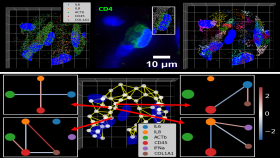Brianna Jones, a student in the Project ENGAGES program at the Georgia Institute of Technology, was featured recently on Atlanta radio station WABE 90.1 FM, a National Public Radio affiliate.
Project ENGAGES (Engaging New Generations at Georgia Tech through Engineering & Science) is a high school science education program developed at the Petit Institute for Bioengineering and Bioscience at Georgia Tech in partnership with Coretta Scott King Young Women's Leadership Academy, B.E.S.T Academy, KIPP Atlanta Collegiate, Benjamin E. Mays High School, Charles R. Drew Charter High School and South Atlanta High School, six minority-serving public high schools in the City of Atlanta.
ENGAGES is co-directed by Manu Platt, associate professor in the Wallace H. Coulter Department of Biomedical Engineering at Georgia Tech and Emory University, and Bob Nerem, professor emeritus of bioengineering and the founding director of the Petit Institute for Bioengineering and Bioscience at Georgia Tech.
Jones, a senior at Mays High School who works in the lab of Petit Institute Executive Director Andrés García through the ENGAGES program, was interviewed as part of WABE's coverage of the Google global science fair at King Plow Arts Center on Friday. You can read and listen to the story here.
Media Contact
Keywords
Latest BME News
Commercialization program in Coulter BME announces project teams who will receive support to get their research to market.
Courses in the Wallace H. Coulter Department of Biomedical Engineering are being reformatted to incorporate AI and machine learning so students are prepared for a data-driven biotech sector.
Influenced by her mother's journey in engineering, Sriya Surapaneni hopes to inspire other young women in the field.
Coulter BME Professor Earns Tenure, Eyes Future of Innovation in Health and Medicine
The grant will fund the development of cutting-edge technology that could detect colorectal cancer through a simple breath test
The surgical support device landed Coulter BME its 4th consecutive win for the College of Engineering competition.
New research from Georgia Tech helps doctors predict how therapies will interact with a child's immune system, potentially improving outcomes and reducing risks.








